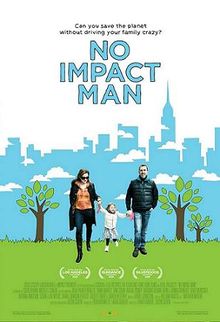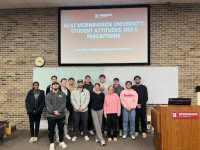By Gustav Hollnagel–
Colin Beavan, began his project “No Impact Man” in November of 2006.

His outlook was to make as little environmental impact as possible. The film adaptation of Colin’s project was shown in the UPS Lincoln Center on Monday (April 4). Next week, he will speak on campus about how we, as the young citizens that we are, can make a difference.
Student activist Kristin Shaw helped organizing both the film showing and the event that’s coming up next week. She said, “Last night we talked afterwards and students were coming up with great ideas, from composting our cafeteria waste to buying at the local farmers market. I really am excited for him to come and give us some advice and motivation!”
The project helped Colin to grasp the intensity and need for environmental activism. At some point, he inadvertently had to call himself a self-proclaimed environmentalist, who had gathered a lot of doubters or people who ridiculed his choice.
Colin pulled his wife Michelle into it because it could have cured her addiction to coffee products and retail articles such as purses and clothes. Soon, it became a family project, as two-year-old daughter Isabella had to subsist under her parents’ ambitions.
The film “No Impact Man” previewed in 2009 at the Sundance Film Festivals. Directors L. Gabbert and J. Schein produced a very intimate, front-row experience for outsiders and observers. They focus on the materialistic sacrifices the family went through step-by-step and zoom in on how “having no impact” is in fact impacting their life as a family.
Colin systematically took things away from their lives. The initial plan was: no elevators, no TV, no paper, no tissues, no imported foods, no transportation based on carbon-related emissions. Colin himself called the plan a “learning as I go” condition, as he originally didn’t consider himself an environmentalist. The paradigm, so Colin, is “reduce, re-use, and recycle”.
He wrote two history books as an independent writer and then wanted to do something else, something bigger, that is. He wanted to become an activist writer who could inspire the people around him. This project was designed to help him.
In the movie, the family does their laundry in the bathtub and after six months solely relied on candlelight – no electricity at all.
“Seeing that they went completely off the grid for 6 months with no electricity was awe inspiring,” Shaw said. “I couldn’t imagine coming home and having to do homework by candlelight, especially when I do my homework late at night.”
The viewer can see Colin introducing more and more concepts of living by “no impact”. So, he would mix his own laundry detergent and shampoo and pour it into used, empty health and beauty aid containers. He would also brush his teeth with baking soda.
The family would also solely nourish from local farm and dairy products, which come from in-state (NY) sources within a range of 250 miles. “The average piece of food has travelled 1500 miles from farm (original source of production) to the market,” said Colin in the movie.
According to Colin, the central question of his quest was, “Do we have to be a disposable culture? We need to get away from things we throw away.”
As an example, he said that about 49 million plastic diapers are buried in a landfill every day. That’s the 3rd-largest trash production considering a single product. In the film, daughter Isabella is wearing cloth diapers instead.
Colin’s story received quite a lot of coverage in the media once the word about the project spread out. But the stories weren’t always positive. The Times posted stories that ridiculed Colin’s project, basically saying it was dumb to live with all these sacrifices.
Colin’s response? “There are actual benefits to living environmentally.” He and wife lost weight, became better parents, and helped out local farmers. Instead of diminishing the project, the story headlines could easily have been, “How I lost 20 pounds without going to the gym once,” said Colin.
Colin has received all kinds of attention. He went to the Colbert Report and gave interviews on several shows on ABC and CNN.
Next week, on Monday (April 11), Colin will pay a visit to Morningside. Shaw hopes that, “it will encourage people to get involved or do one small thing for the earth in their lives they live today.“
If you cannot come to the event, here’s an advice from Colin that was conveyed in the film and summarized by Shaw: “His one bit of advice that he shares, as someone asked him what is one thing they can do to help the environment, was to volunteer with an environmental organization. It instills the idea of “community” back into our lives.”






Leave a Reply